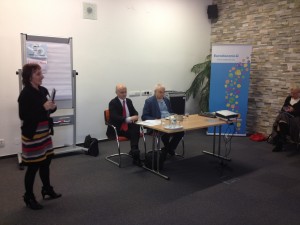 More than 20 attendees from Eurodiaconia member organisations in the Czech Republic were treated to a wealth of learning and networking opportunities during the two-day Training on the Europe 2020 strategy and the European Semester in Prague early last week.
More than 20 attendees from Eurodiaconia member organisations in the Czech Republic were treated to a wealth of learning and networking opportunities during the two-day Training on the Europe 2020 strategy and the European Semester in Prague early last week.
The event, co-organised with our members The Salvation Army in Czech Republic, the Diaconia of the Evangelical Church of the Czech Brethren (DECCB) and Slezská Diakonie, was a favorable opportunity to support local diaconal organisations to become more involved in EU policy processes aimed to boost job creation and growth.
Participants had a frank and constructive discussion, covering the major issues and concerns in order to identify the priorities and actions necessary to address social needs in the country. Through the plenary and the group exercise they also had the chance to share experiences, challenges and technical knowledge on how to put in motion the relevant actions needed to achieve the national Europe 2020 targets. Participants agreed on the need for strengthening the cooperation among diaconal organisations and other partners working on the social field, and to learn from different contexts. Their diagnosis of the social situation in the Czech Republic also underlined the need to boost integration between the health and social care sectors and improve the professional status of social workers. Efforts are also needed to guarantee accessible housing, address rising over-indebtedness and promote higher living standards, as a high proportion of the Czech population is just above minimum income levels.
On the second day, Mr Vladimír Špidla, former Prime Minister of the Czech Republic and former Commissioner for Employment and Social Affairs, participated in a panel discussion taking stock of what the EU has brought to the Czech Republic from the perspective of social services and poverty reduction. Mr Špidla focused his speech on the importance of the Europe 2020 strategy to move the Czech Republic decisively beyond the crisis, delivering sustainable and inclusive growth through more effective investments in education, services aimed to women and children and innovation.